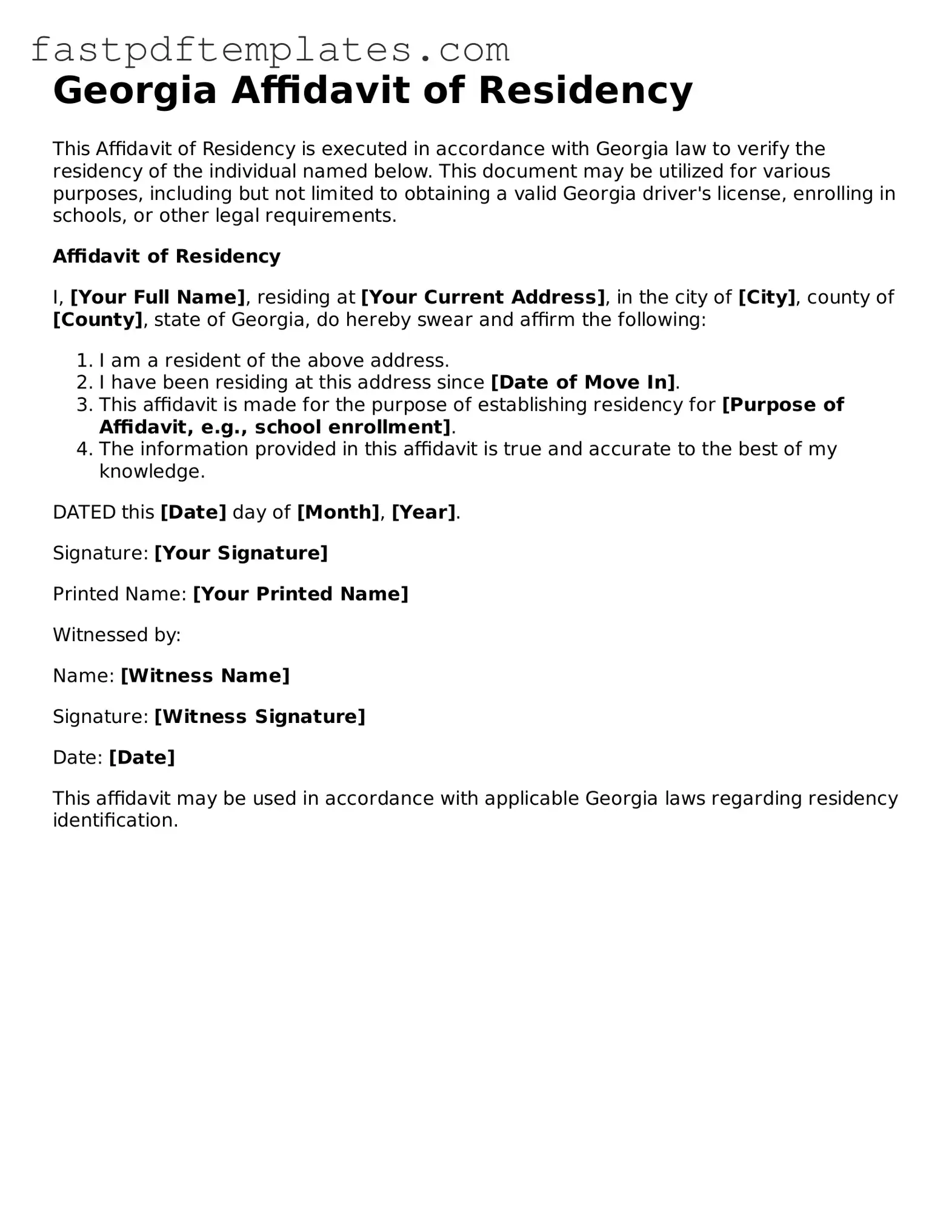The Georgia Affidavit of Residency form shares similarities with the Affidavit of Support, commonly used in immigration processes. Both documents require a sworn statement from an individual regarding their relationship to another person, typically to demonstrate financial support or residency. In both cases, the individual providing the affidavit must affirm the truth of their statements under penalty of perjury, ensuring that the information is reliable and can be used in legal contexts.
Another document that resembles the Georgia Affidavit of Residency is the Lease Agreement. While the Affidavit of Residency serves to confirm where a person lives, a Lease Agreement outlines the terms under which a person rents a property. Both documents establish a connection to a specific address, but the Lease Agreement is a legally binding contract, whereas the Affidavit is a sworn statement. Each document plays a crucial role in proving residency and establishing rights related to a particular property.
The Declaration of Domicile is also similar to the Georgia Affidavit of Residency. This document is often used to declare a person's permanent residence for legal purposes, such as voting or taxation. Like the Affidavit of Residency, it requires the individual to assert their primary residence. Both documents help clarify an individual's legal status in a specific location, although the Declaration of Domicile typically has broader implications for legal residency.
Next, consider the Voter Registration Application. This form is used to register individuals to vote in their respective states. Similar to the Affidavit of Residency, it requires proof of residence, as voters must be registered at their primary address. Both documents help ensure that individuals are participating in civic duties from their correct residential locations, reinforcing the importance of accurate residency information.
The Change of Address Form, often submitted to postal services, bears resemblance to the Georgia Affidavit of Residency. This form is used to officially notify the postal service of a new address. While the Affidavit serves as a legal declaration of where someone resides, the Change of Address Form is more administrative. However, both documents highlight the importance of maintaining accurate records regarding where individuals live.
Another related document is the Certificate of Residency, which is often required for tax purposes. This certificate confirms that an individual resides in a specific jurisdiction, similar to the Georgia Affidavit of Residency. Both documents aim to establish residency for legal and administrative reasons, although the Certificate of Residency often has specific implications for taxation and local government services.
The Affidavit of Identity is also comparable to the Georgia Affidavit of Residency. This document is used to confirm a person's identity, often in legal proceedings. While the Affidavit of Identity focuses on establishing who someone is, the Affidavit of Residency centers on where they live. Both documents require a sworn statement and can be used to support an individual's legal claims.
Additionally, the Proof of Residency Letter, often provided by landlords or utility companies, is similar in purpose to the Georgia Affidavit of Residency. This letter serves as evidence of where someone lives, typically including the individual's name and address. While the Proof of Residency Letter is often less formal than an affidavit, both documents are used to verify residency for various legal and administrative needs.
Finally, the Parental Affidavit, commonly used in educational settings, shares similarities with the Georgia Affidavit of Residency. This document is often used by parents to affirm their child's residency for school enrollment purposes. Both forms require a sworn statement regarding residency, emphasizing the importance of accurate information in determining eligibility for services, whether educational or otherwise.

